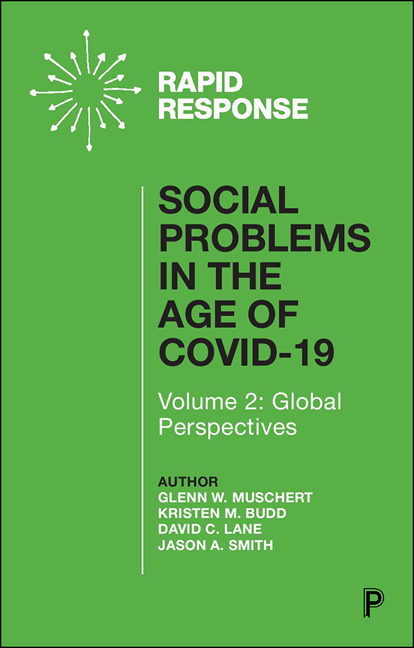Book contents
- Frontmatter
- Contents
- Acknowledgments
- Presidential Welcome
- Editorial Introduction
- 1 Isolation, Economic Desperation, and Exploitation: Human Trafficking and the COVID-19 Crisis
- 2 Uncertainty and Disruption in the Transition to Adulthood During COVID-19
- 3 Disability Rights and Healthcare Rationing during COVID-19
- 4 Social-Distancing the Settler-State: Indigenous Peoples in the Age of COVID-19
- 5 The Pandemic and the Invisible Poor of the Global South: Slum Dwellers in Mumbai, India and Dhaka, Bangladesh
- 6 The Human Right to Water and Sanitation in the Age of COVID-19
- 7 Pandemic Perils of Migrant Workers: Inequalities Intensified
- 8 Food Insecurity and COVID-19
- 9 Protecting Refugee Health and Human Rights in the Context of the COVID-19 Pandemic: Challenges and Pathways to Justice
- 10 COVID-19 Requires an Intersectional Feminist Policy Response
- End Matter
- Afterword
- Index
6 - The Human Right to Water and Sanitation in the Age of COVID-19
Published online by Cambridge University Press: 23 March 2021
- Frontmatter
- Contents
- Acknowledgments
- Presidential Welcome
- Editorial Introduction
- 1 Isolation, Economic Desperation, and Exploitation: Human Trafficking and the COVID-19 Crisis
- 2 Uncertainty and Disruption in the Transition to Adulthood During COVID-19
- 3 Disability Rights and Healthcare Rationing during COVID-19
- 4 Social-Distancing the Settler-State: Indigenous Peoples in the Age of COVID-19
- 5 The Pandemic and the Invisible Poor of the Global South: Slum Dwellers in Mumbai, India and Dhaka, Bangladesh
- 6 The Human Right to Water and Sanitation in the Age of COVID-19
- 7 Pandemic Perils of Migrant Workers: Inequalities Intensified
- 8 Food Insecurity and COVID-19
- 9 Protecting Refugee Health and Human Rights in the Context of the COVID-19 Pandemic: Challenges and Pathways to Justice
- 10 COVID-19 Requires an Intersectional Feminist Policy Response
- End Matter
- Afterword
- Index
Summary
The Problem
The United Nations General Assembly recognized water and sanitation as a fundamental human right in July 2010. Water is inarguably a basic necessity of life, and safe and improved sanitation systems are both fundamental to optimal health and necessary for the protection of public health. Yet the global pandemic, COVID-19, has further revealed the divergence between the vision of the human rights framework and the realities of the everyday conditions of millions worldwide who lack secure and plentiful access to safe water and sufficient sanitation.
The World Health Organization (WHO) declared COVID-19 a global pandemic on March 11, 2020. Expert advice has centered on handwashing and hygienic practices, in addition to social distancing and contact tracing, to prevent the spread of the virus. Preventative practices such as these presume abundant access to the basic features of modern water and sanitation systems, yet data at the global, national, and local levels demonstrate highly uneven access to clean water, with sociocultural, racial/ethnic, socioeconomic, and geographic inequalities shaping divergent experiences for communities that may directly impact their health. Indeed, lack of access to clean water limits the ability to protect oneself from COVID-19 through preventative hand hygiene. Individuals, households, and communities without secure access to clean water experience greater vulnerability to exposure of COVID-19, due to their limited ability to practice recommended guidelines for frequent handwashing with ample soap and water. Proper waste management is also key to preventing the spread of infectious diseases such as COVID-19. Where there is a lack of secure and improved sanitation systems to safely isolate and treat human waste, households and communities are less able to protect water sources from being contaminated and to protect themselves from exposure through social distancing, further exacerbating the risks to individuals and to public health from exposure to COVID-19.
Less developed areas of the world are more likely to have higher rates of death and disease as a result of unimproved systems of sanitation, and contaminated water continues to cause death and disease at alarmingly high rates globally. WHO estimates that diarrhea from contaminated water and poor sanitation is linked to the deaths of 842,000 people each year, and is among the leading causes of child mortality under five years of age in less developed countries.
- Type
- Chapter
- Information
- Social Problems in the Age of COVID-19 Vol 2Volume 2: Global Perspectives, pp. 61 - 72Publisher: Bristol University PressPrint publication year: 2020

